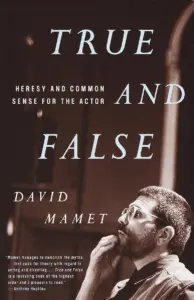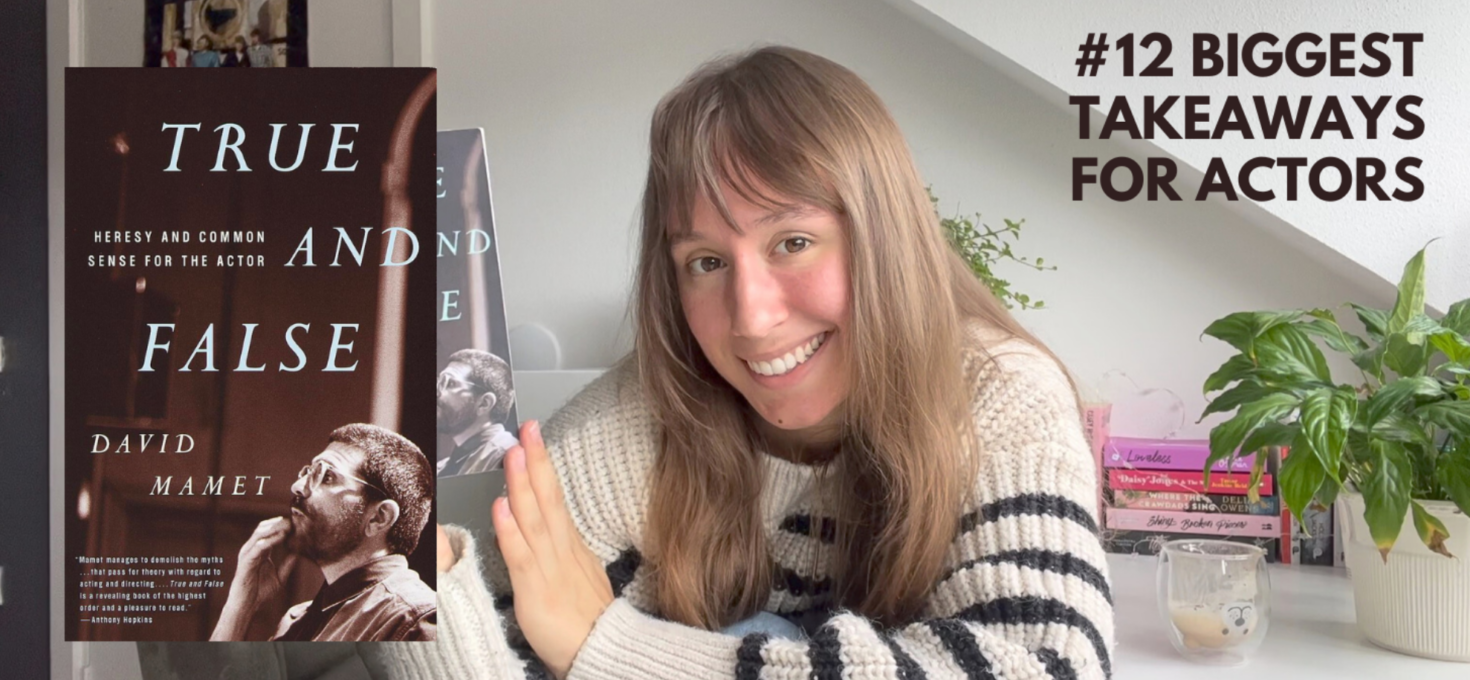David Mamet shares his visions on acting in this short book that covers everything from school, to auditions, to rehearsals, to performance. In this blogpost I will share my 12 biggest takeaways from reading this book.
Not in a reading mood? I’ve posted a video going over the 12 points on my YouTube channel!
Click here to display content from YouTube.
Learn more in YouTube’s privacy policy.
→ If you want to read more of what Mamet has to say, get a copy for yourself:
I’m curious to hear your thoughts as well. Mamet shares some strong opinions on topics I’m not sure I agree with. What about you? Let me know down below! Now let’s get into the twelve takeaways I want to share with you:
1. Outward directedness
For every takeaway I’ll share what David Mamet wrote in his book and then tell you my thoughts on it. Here’s what was written:
‘In “real life”, the mother begging for her child’s life, the criminal begging for a pardon, the atoning lover pleading for one last chance- these people give no attention whatever to their own state, and all attention to the state of that person from whom they require their object. This outward-directedness brings the actor in ”real life” to a state of magnificent responsiveness and makes his progress thrilling to watch.’
I feel like this piece of advice is taught in acting all the time, but this was the first time it actually stuck with me, or at least the first time I actually understood what was meant by it.
In a scene, you don’t want to be focussing on what you look like and thinking about how you’ll respond next. You should have your attention with the other person. How are they responding? What do you want from them?
You, as your character, have a certain goal, for example: get an apology out of the other person. Take this goal seriously and don’t leave the stage without fighting for it.
2. Devoted to a craft
‘It is not childish to live with uncertainty, to devote oneself to a craft rather than a career, to an idea rather than an institution. It’s courageous and requires a courage of the order that the institutionally co-opted are ill equipped to perceive.’
I just thought this was a really nice outlook on creative careers. We are often told that our careers are not financially stable, not future proof etc. I liked that he touched on this subject and wrote that it’s in fact not childish, but actually brave to walk this uncertain path.
3. Unlearn habits
‘We are of course trained in our culture to hold our tongue and control our emotions and behave in a reasonable manner. So, to act one has to unlearn these habits, to train oneself to speak out, to respond quickly, to act forcefully, irrespective of what one feels and in so doing to create the habit, not of ”understanding”, not of “attributing” the moment, but of giving up control and, in so doing, giving oneself up to the play.’
Fast forward a few sentences, he writes:
‘In life, there is no emotional preparation for loss, grief, surprise, betrayal, discovery; and there is none on stage either. Forget the funny voices, pick up your cue, and speak out even though frightened’
Once again he’s saying: react. Don’t give yourself time to prepare for what you’re going to say. If you’re scared, take it with you. That’s what makes it real.
I just thought this was a really nice outlook on creative careers. We are often told that our careers are not financially stable, not future proof etc. I liked that he touched on this subject and wrote that it’s in fact not childish, but actually brave to walk this uncertain path.
4. You are your character
‘The ideas, organisations, actions, and people you support and dedicate yourself to, mold and finally are your character. Any other definition is the jabbering of the uncommitted. Certainly the weak would like you to believe that character is a costume which can be put on and taken off at will. And from time to time we’d all like to believe it. But that doesn’t make it true.’
At the beginning of this post I wrote that there are certain things that I don’t know if I completely agree with. This might be one of those things. Mamet talks about the character as being you. Your idea’s, actions, etc. Yet he expresses a strong opinion against Method acting. I do see how you could say that you can only play something that’s already inside of you, similarly to the fact that you can only dream about something you’ve already seen. I just think that there might be characters so far away from you that this philosophy doesn’t really work on.
5. You are unique
‘You are not one of the myriad of interchangeable pieces, but a unique human being, and if you’ve got something to say, say it, and think well of yourself while you’re learning to say it better.’
This one was just short and sweet. I liked the way he worded this. It’s also a great reminder that we as actors can always work to improve our craft, but that doesn’t mean we can’t be confident performing the way we are right now.
6. Nothing to do with hard work
‘Historically, the artist has been feared because his or her job has nothing to do with hard work. There’s nothing you or I could do to enable us to paint like Caravaggio, or to skate like Wayne Gretsky. We could work all day every day for millennia, and we would never achieve that goal.’
Mamet’s outlook on art. An artist isn’t just an artist because he worked hard and put a lot of hours into something. It’s because he brings something unique that can’t be learned.
Now, if you think at our halfway point “Hmmm I think I’ll get this book myself to see what else this man has to say”, Here’s your link:

7. The rehearsal process
‘What should happen in a rehearsal process? Two things.
- The play should be blocked.
- The actors should become acquainted with the actions they are going to perform.’
Mamet believes that everything other than these two things are unnecessary. Character work, understanding the script, you don’t have to spend time on that. Just say the lines as they were written in the script.
8. Your job to be truthful and brave
‘I don’t know what talent is, and, frankly, I don’t care. I do not think it’s the actor‘s job to be interesting. I think that is the job of the script. I think it’s the actor’s job to be truthful and brave– both qualities that can be developed and exercised through the will.’
This comes back throughout the book a few times. It’s not up to the actor to be interesting or funny. The script either is or isn’t and if it isn’t, there is nothing you can do to fix it.
He does say however, that the braveness and truthfulness you need, you can work on. You can learn to be an actor, when you understand what it means to be an actor.
9. Things you can or can’t avoid
‘Cultivate the habit of only having aversion for those things you can avoid (those things in yourself) and only desiring those things that you can give yourself. Improve yourself.’
I know it’s easier said than done, but the realisation that it makes no difference to worry about stuff out of your reach will help you be at peace with all that seems to happen to you. Rejections, missed opportunities, these things will happen the way they do and all you can influence is your reaction to them. Improve your skills and keep working!
10. To face the world is brave
‘To face the world is brave. To turn outward rather than inward and face the world which you would have to face in any case- such may not always win the day, but it will always allow you to live the day as an adult.’
This one kind of circles back to the first takeaway about outward-directedness and the third one about speaking out, responding quickly, and acting forcefully. Let the world see your emotions, take your nervousness and uncertainty with you and step into the spotlight despite it.
11. The audience will accept anything
‘The audience will accept everything they are not given a reason to disbelieve.’
Mamet goes on to give an example. When someone is pointed out to us as being rich, we begin to look at them a little differently. We observe how a rich person drinks their tea and lights their cigarette even though they have done nothing. A characteristic was ascribed to them and we accepted it.
He continues by saying that this characterisation is the job of the script, not of the actor. ‘You don’t have to portray the hero or the villain. That’s been done for you by the script.’
12. Show the audience some heroism
‘You can show the audience some heroism. That’s why they came to the theater. They didn’t come to see “technique”, whatever that may be. You are going to bring your unpreparedness, your insecurities, your insufficiency to the stage whatever you do. When you step on stage, they come with you. Go on stage and act in spite of them. Nothing you do can conceal them. Nor should they be concealed.
And when you go on stage determined to act, that is, to get what you came for, and not be denied, you can come offstage at peace’
Go on stage and be unapologetically yourself. You’re going to be nervous and maybe even feel unprepared. Often we convince ourselves we need more. More time, more practice, more knowledge. But the best teacher is the stage. Have your goal clear and step onto that stage fighting for that goal.
And with that we’ve come to the end of this article. I hope these sections from David Mamet’s book inspired you and made you think about your own opinions on some of these topics. Have these snippets piqued your interest and would you like to read the rest by yourself? be sure to get a copy!
- Let me know what you thought in the comments!
- This post contains affiliate links. Whenever you buy a product through one of these links, I earn a small commission. This does not affect the price for the buyer!
